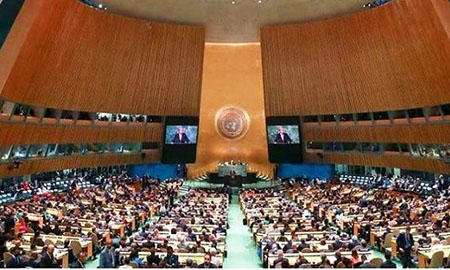Special to WorldTribune.com
 By John J. Metzler, September 17, 2023
By John J. Metzler, September 17, 2023
Presidents, prime ministers, kings and potentates are converging on New York for the opening session of the United Nations General Assembly. The 78th annual Assembly of the world organization presents both a global gala and expanded Summit meeting to try to solve a myriad of crises facing the international community.
While the ongoing and yet unresolved war in Ukraine shall take front and center among the 193 assembled UN members, so too will solving the herculean challenge of the Sustainable Development Goals, a seventeen-point mantra for countries ranging from no hunger, clean water, quality education and zero poverty. The UN says, “ending poverty must go hand-in-hand with strategies that build economic growth.” Realistically, the SDG’s are probably only partially attainable given the worsening conflicts and humanitarian challenges worldwide.
Amb. Dennis Francis of Trinidad and Tobago has been elected as President of the 78th Assembly. His slogan “Peace, Prosperity, Progress and Sustainability” encompasses a goal and spirit.

Actually, this session is the first full-fledged Assembly since the pandemic; 145 world leaders will arrive along with an expected 15,000 diplomats, delegates and staff. Opening day of the General Debate on Sept. 19 sees the first speaker, by tradition, being the president of Brazil (the socialist Lula), then the United States, and others among Turkey, Ukraine and the Islamic Republic of Iran.
In parallel to the ongoing political events, there’s a huge security operation throughout New York City where speeding motorcades, street closings, helicopters and Coast Guard ships on the East River all form part of the Assembly’s security bubble, especially during the first week. The NYPD is tasked to the hilt to provide security but also keep the rest of the city moving safely too.
Interestingly China, France, Russia and the UK are not sending their presidents nor prime ministers. Obviously, Russia’s Vladimir Putin fears arrest while on American soil, China’s Xi Jinping appears preoccupied by domestic economic and political concerns. The UK’s Rishi Sunak is not expected either.
France’s Emmanuel Macron shall not attend; He’s hosting Britain’s King Charles II on his delayed visit to Paris. Moreover, the time slot for France to speak is late on a Saturday.
Despite the still shifting schedules, the fact remains that of the five Permanent Security Council members, only the United States will be represented by the head of government, Joe Biden.
A growing list of humanitarian crises confronts the assembled delegates as both natural disasters such as earthquakes (Turkey and Morocco) compete for funds and attention from long running civil conflicts in Syria, Libya and Ethiopia.
Without question Russia’s war in Ukraine remains the biggest global flashpoint; We are probably tiptoeing around some sort of nuclear confrontation more than we wish to believe.
Though most member states rightfully condemn Russia’s aggression in Ukraine, where are the calls for peace? During almost any war diplomatic trial balloons and peace plans are floated to try to solve the conflict. Now largely crickets.
The signature General Debate session offers a weeklong talk fest where Presidents and Prime Ministers grandly state their country’s vision and viewpoint on varied world crises. Sadly, there’s little oratory but instead political palaver and rote rhetoric. Usually by the second day of
“debate” the droning speeches inside the cavernous Assembly Hall create torpid boredom.
Naturally there’s an element of time tested ritual during the General Debate where UN Protocol usually flawlessly choreographs what emerges as a diplomatic dance where all the partners, players and estranged participants seem to be on site and on cue not only for their formal speeches but more significantly for the sideline “bilateral” meetings either one on one or with allied groups; ASEAN, EU, African Union etc.
But beyond the high-level week, the Assembly then sets into a laborious routine covering 172 agenda items from areas of Maintenance of Peace and Security, Promotion of Human Rights, Disarmament and International Law. Specific issues like the Question of Palestine or the Situation of Democracy and Human Rights in Haiti are among the items. Overall, a disproportionate number of agenda items for debate concern and criticize Israel.
There’s discussion and action on program budgets for various UN operations and financing for the myriad of global Peacekeeping missions.
Thus, the UN complex on the East River becomes the undisputed center for global diplomacy for a few weeks each year. Speaking on the eve of the new Assembly, Secretary General Antonio Guterres stated, “This is not a time for posturing or positioning. This is not a time for indifference or indecision.”
John J. Metzler is a United Nations correspondent covering diplomatic and defense issues. He is the author of Divided Dynamism the Diplomacy of Separated Nations: Germany, Korea, China (2014). [See pre-2011 Archives]
